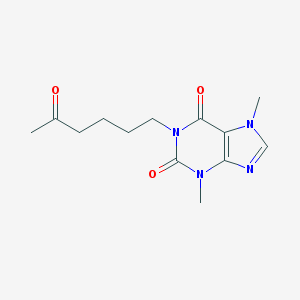Parkinson's disease is not a prion disease, but a amyloid degeneration disease
-
Last Update: 2021-02-15
-
Source: Internet
-
Author: User
Search more information of high quality chemicals, good prices and reliable suppliers, visit
www.echemi.com
is a growing global health problem affecting the world's ageing population. Japan's population is ageing faster than any other population on Earth, a factor that has accelerated the country's research into several neurodegenerative diseases. More than 10 million people worldwide suffer from Parkinson's disease, according to the World Health Organization (EHO).In recent years, neuroscientistes have debated whether prion-like activity can damage the brains of people with Parkinson's disease. However, in a new study, after a detailed analysis, Japanese researchers report that there is no evidence that misfolded, spreadable proteins persist in Parkinson's disease. The findings, published in the September 3, 2019 issue of the journal PNAS, are titled "Parkinson's disease is type of a amyloidosis life-eding of a amyloid fibrils of α-synuclein."All proteins are folded into complex structures that determine function. Prion is a misfolded, spreadable protein that destroys nerve tissue and is the cause of several catastrophic but rare diseases that affect humans and animals--- spongiform encephalopathies ---. Examples of creutzfeldt-Jakob, Gerstmann-Straussler-Scheinker syndrome and kuru are human defed encephalopathy caused by prions. In animals, sheep itching and bovine spongi-like encephalopathy (known as mad cow disease) are both prion diseases.In healthy people, misfolded proteins are discarded by cells and broken down into their own amino acids. Prions are deadly because they are infectious factors that spread throughout healthy tissue and induce previously normal proteins to fold incorrectly.In Parkinson's disease, some scientists have suggested that prion-like mechanisms help drive neurodegenerative processes associated with the disease. But in the new study, led by Dr. Katsuya Araki, a researcher at Osaka University Medical Research Institute in Japan, a large team of scientists from several research centers in Japan found no signs of prion-like activity after micro-beam X-ray diffraction analysis of the brains of autopsies from people with Parkinson's disease. This finding suggests that the prion hypothesis for Parkinson's disease is not supported.The researchers studied a variety of samples from people with Parkinson's disease. Parkinson's disease is an aggressive age-related disease associated with the central nervous system. The disease is characterized by tremors, muscle stiffness and gait. Further features of Parkinson's disease are the degeneration of the neural sections of the cerebral basal and the deficiency of the important neurotransmitter dopamine. In addition, an equally important feature is the α-synactal nucleoproteins. In Parkinson's disease, α-synactal nucleoproteins come together to form a structure called the Louisus. The structure of these damaged tissues is associated with the death of brain cells."It has recently been reported that aggregates of α-synactal nucleoproteins and cross β structures can be transmitted in the brain in a manner similar to prion viruses," Araki and his colleagues wrote in the paper. However, there is still no evidence that this transmission occurs in the patient's brain.according to in-body and animal studies, although α-synaptic nucleoprotein is present in large quantities in the healthy brain and in other parts of the body, it is thought to occur in Parkinson's disease with misfolding. The findings have some neurobiologists suggesting a prion-like mechanism. Animal studies in recent years have increased α that these two-synactal nucleoproteins may have prion-like activity, but there has never been clear evidence.In 2012, Virginia Lee, a neurobiologist at the University of Pennsylvania, injected abnormally shaped synthetic α-synthesized nucleoproteins into the brains of normal mice, observing not only the emergence of key features of Parkinson's disease, but also the deterioration of symptoms over time. Lee concludes that the disease is caused by the α-synaptic nucleoproteins that spread between nerve cells.Araki and researchers from six Japanese research institutes are looking for another route. Using micro-beam X-ray diffraction to study samples, the researchers had a technique to reveal the link between structure and pathology, but the technique produced no evidence that α-synaptic nuclear proteins had spread between cells.With the development of micro beam X-ray diffraction research, people have a deeper understanding of various types of protein misfolding phenomenon, which has become a choice to study the pathology of a variety of diseases. This technique reveals that protein misfolding without prion-like activity is associated with several other diseases, including cataracts, type 2 diabetes, and Alzheimer's disease.As a result of the new study, the researchers concluded that Parkinson's disease has the same characteristics as Alzheimer's disease, in which there are glial plaques made up of amyloid proteins in Alzheimer's disease. "Our findings support the concept of Parkinson's disease as amyloidosis, a disease characterized by the accumulation of α-syngent nuclear protein amyloid fibers," Araki and his colleagues wrote. Manyrecent years have raised a variety of scientific questions about the potentially harmful mechanisms of Parkinson's disease, including the prion hypothesis that emerged more than a decade ago. In addition, other scientists have explored whether changes in the gut microbiome affect Parkinson's disease that occurs in the brain. (Bio Valley)
This article is an English version of an article which is originally in the Chinese language on echemi.com and is provided for information purposes only.
This website makes no representation or warranty of any kind, either expressed or implied, as to the accuracy, completeness ownership or reliability of
the article or any translations thereof. If you have any concerns or complaints relating to the article, please send an email, providing a detailed
description of the concern or complaint, to
service@echemi.com. A staff member will contact you within 5 working days. Once verified, infringing content
will be removed immediately.







